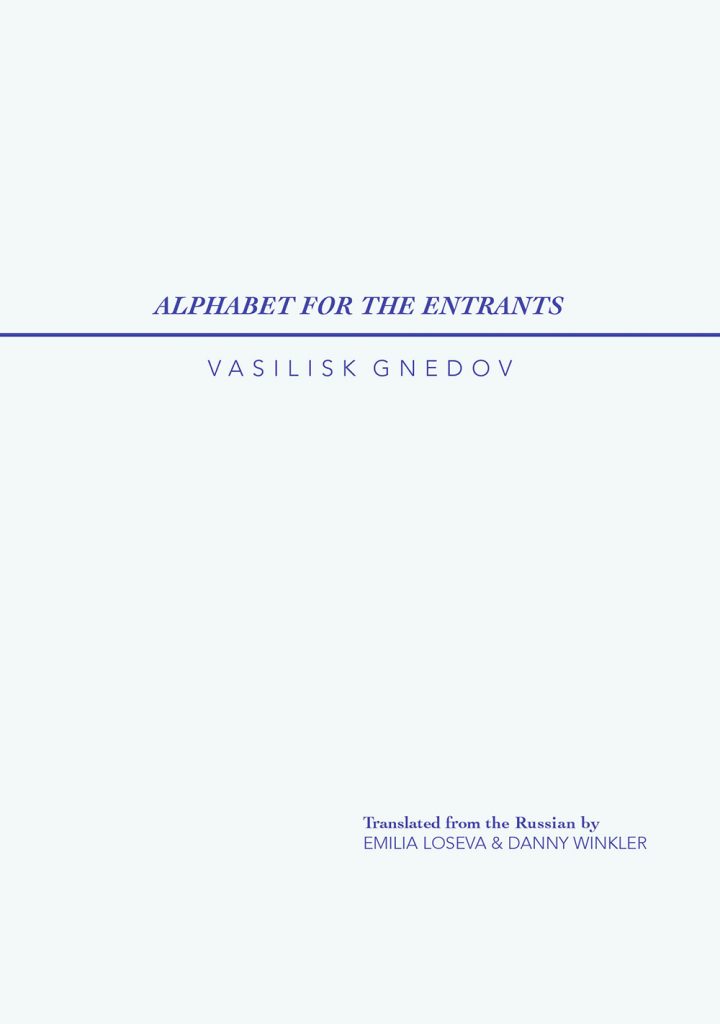Oflustrelessunlighdimlongreeng
thequailwhiskourouslyprickles
Wheezabusiflaxelluminaspen
Withisredsicklepiercedmanboutoad
Curletsplashouslybirchreetheesing
theoutsingingflewaywithesun
We’rethoughtobethefools
butwefools’rebetterthanthecleverones

Alphabet for the Entrants
Vasilisk Gnedov
Translated by Emilia Loseva, Danny Winkler
October 2018
The joyful energy and bewildering chaos of Gnedov’s futurist poetry truly comes to life...
Crispin Brooks
Bringing together a selection of his early Futurist works and poems from his later years, Alphabet for the Entrants is the first stand-alone volume of poetry by Vasilisk Gnedov available in English. Marked by the vibrancy and self-grandiosity of a rising literary star, the early poems seek to forge a new language by dissembling the old. The later poems, stripped of formal experimentation, reveal a meditative consciousness refined through years of personal turmoil. By turns inscrutable and aphoristic, caustic and tender, morose and ebullient, the poems express the poet’s evolving view of poetry and the rapidly changing world around him.
About the Author
Vasilisk (Vasily) Gnedov (1890–1978), a central figure in Russian Futurism, published his best-known work, Death to Art, on the brink of the first World War. Abrasive and wily in his younger years, he became known for his provocations and poetry, which actively sought to collapse language in on itself. Swept up by the cataclysmic events of twentieth-century Russia, he eventually returned to his homeland of Ukraine, where he died in obscurity.
Praise
We may finally have arrived at the future when the unique literary interventions of Vasilisk Gnedov — the most radical poet of his generation — can be fully recognized and fairly evaluated. A stenographer of silence, Gnedov was the epitome of the Hylaean Cubo-Futurists — a group of which he was never a member. His verse itself is replete with such paradoxes: idiosyncratic colloquialisms; folksy neologisms; a pastoral poetics of urban mechanization; elegant formal experiments in abstraction hard upon blunt sophomoric vulgarisms. These dynamic tensions animate every line, and in the inspired translations by Loseva and Winkler you can hear the singing of contemporaneity.
Craig Dworkin
Over 100 years after it was written, the joyful energy and bewildering chaos of Vasilisk Gnedov’s futurist poetry truly comes to life for the first time in English. Loseva and Winkler’s translations are remarkable in capturing both the spirit and meanings of his idiosyncratic verbal art.
Crispin Brooks
Vasilisk Gnedov (1890-1978) is one of the most undervalued members of the remarkable generation of Russian Futurism that included those more prominent practitioners of neologism, Velimir Khlebnikov and Aleksei Kruchenykh. Gnedov's lyricism is every bit as magical as his nome de plume (the chimerical Basilisk) implies: in place of Kruchenykh's dark sarcasms and Khlebnikov's folkloricism, what we have here in the impressively playful English versions of Loseva and Winkler, is the sheer, unalloyed musical pleasure of folksy patois and child's babble. The inclusion of a few of his late poems – he returned to poetry in the 1970s after a long silence engendered by repression and 20 years imprisonment – offers a hint of the genuine lyrical talent that would have undoubtedly developed, if…
Alex Cigale
About the Translators
Emilia Loseva is an independent author who writes and translates poetry, essays, film scripts and conceptual texts for multi-disciplinary events. She worked on films and other projects with Danny Winkler. Together they completed a book of English translations of Russian Futurist poet Vasilisk Gnedov. This undertaking followed the translation of an anthology of Futurist poets, “Futurosis”, for a music project by avant-garde composer Nick Sudnik. She is currently translating the experimental poetry of Willy Melnikov for a forthcoming event in St Petersburg.
Danny Winkler (1976 – 2014) worked with experimental photography before completing postgraduate Visual Anthropology studies at Goldsmiths College in London.rnHaving previously worked with the United Nations, British Council, and One World Media, he was involved with anthropological projects, documentary scripts and freelance writing.
Publication Details
Chapbook
Hand-bound. 32 pp, 5.25 x 7.5 in
Publication Date: October 01 2018
Distribution: Direct Only
Series: Eastern European Poets Series #44